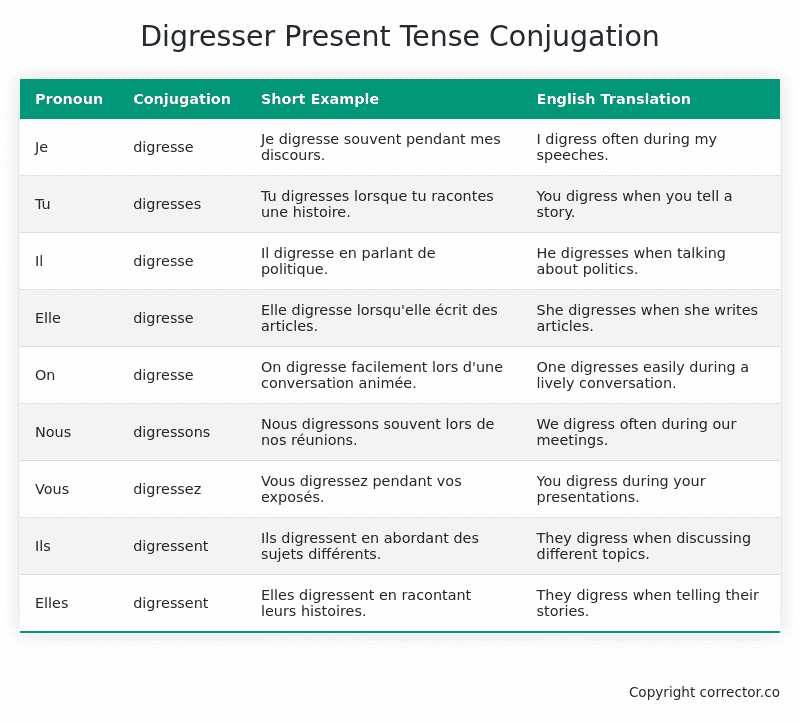Le Present (Present Tense) Conjugation of the French Verb digresser
Introduction to the verb digresser
The English translation of the French verb “digresser” is “to digress.” The infinitive form of “digresser” is pronounced as “dee-greh-seh.”
The word “digresser” comes from the Latin word “digressus,” meaning “to step aside” or “to deviate.” In everyday French, “digresser” is used to express the act of going off topic or deviating from the main subject while speaking or writing.
Here are three simple examples of its usage with their respective English translations:
-
Je ne veux pas digresser, mais revenons à notre sujet principal.
(I don’t want to digress, but let’s get back to our main topic.) -
Il a tendance à digresser lorsqu’il est nerveux.
(He tends to digress when he is nervous.) -
Excusez-moi de digresser, mais j’ai une question à poser.
(Sorry for digressing, but I have a question to ask.)
This concludes the requested response.
Digresser – About the French Present Tense
To take a deep dive into all the French tenses then see our article on Mastering French Tense Conjugation.
Common Everyday Usage Patterns For Le Present
Interactions with Other Tenses
Table of the Present Tense Conjugation of digresser
| Pronoun | Conjugation | Short Example | English Translation |
|---|---|---|---|
| Je | digresse | Je digresse souvent pendant mes discours. | I digress often during my speeches. |
| Tu | digresses | Tu digresses lorsque tu racontes une histoire. | You digress when you tell a story. |
| Il | digresse | Il digresse en parlant de politique. | He digresses when talking about politics. |
| Elle | digresse | Elle digresse lorsqu’elle écrit des articles. | She digresses when she writes articles. |
| On | digresse | On digresse facilement lors d’une conversation animée. | One digresses easily during a lively conversation. |
| Nous | digressons | Nous digressons souvent lors de nos réunions. | We digress often during our meetings. |
| Vous | digressez | Vous digressez pendant vos exposés. | You digress during your presentations. |
| Ils | digressent | Ils digressent en abordant des sujets différents. | They digress when discussing different topics. |
| Elles | digressent | Elles digressent en racontant leurs histoires. | They digress when telling their stories. |
Other Conjugations for Digresser.
Le Present (Present Tense) Conjugation of the French Verb digresser (You’re reading it right now!)
Imparfait (Imperfect) Tense Conjugation of the French Verb digresser
Passé Simple (Simple Past) Tense Conjugation of the French Verb digresser
Passé Composé (Present Perfect) Tense Conjugation of the French Verb digresser
Futur Simple (Simple Future) Tense Conjugation of the French Verb digresser
Futur Proche (Near Future) Tense Conjugation of the French Verb digresser
Plus-que-parfait (Pluperfect) Tense Conjugation of the French Verb digresser
Passé Antérieur (Past Anterior) Tense Conjugation of the French Verb digresser
Futur Antérieur (Future Anterior) Tense Conjugation of the French Verb digresser
Subjonctif Présent (Subjunctive Present) Tense Conjugation of the French Verb digresser
Subjonctif Passé (Subjunctive Past) Tense Conjugation of the French Verb digresser
Subjonctif Imparfait (Subjunctive Imperfect) Tense Conjugation of the French Verb digresser
Subjonctif Plus-que-parfait (Subjunctive Pluperfect) Tense Conjugation of the French Verb digresser
Conditionnel Présent (Conditional Present) Tense Conjugation of the French Verb digresser
Conditionnel Passé (Conditional Past) Tense Conjugation of the French Verb digresser
Conditionnel Passé II (Conditional Past II) Tense Conjugation of the French Verb digresser
L’impératif Présent (Imperative Present) Tense Conjugation of the French Verb digresser
L’impératif Passé (Imperative Past) Tense Conjugation of the French Verb digresser
L’infinitif Présent (Infinitive Present) Tense Conjugation of the French Verb digresser
L’infinitif Passé (Infinitive Past) Tense Conjugation of the French Verb digresser
Le Participe Présent (Present Participle) Tense Conjugation of the French Verb digresser
Le Participe Passé (Past Participle) Tense Conjugation of the French Verb digresser
Struggling with French verbs or the language in general? Why not use our free French Grammar Checker – no registration required!
Get a FREE Download Study Sheet of this Conjugation 🔥
Simply right click the image below, click “save image” and get your free reference for the digresser present tense conjugation!

I hope you enjoyed this article on the verb digresser. Still in a learning mood? Check out another TOTALLY random French verb present conjugation!


